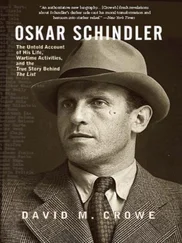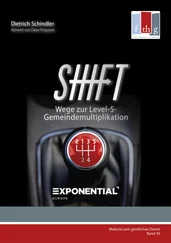“The unconditional surrender of Germany,” he said, “has just been announced. After six years of the cruel murder of human beings, victims are being mourned, and Europe is now trying to return to peace and order. I would like to turn to you for unconditional order and discipline—to all of you who together with me have worried through many hard years— in order that you can live through the present and within a few days go back to your destroyed and plundered homes, looking for survivors from your families. You will thus prevent panic, whose results cannot be foreseen.”
He did not, of course, mean panic in the prisoners. He meant panic among the garrison, among the men lining the walls. He was inviting the SS to leave, and the prisoners to let them do so. General Montgomery, he said, the commander of the Allied land forces, had proclaimed that one should act in a humane way toward the conquered, and everyone—in judging the Germans—had to distinguish between guilt and duty. “The soldiers at the front, as well as the little man who has done his duty everywhere, shall not be responsible for what a group calling itself German has done.” He was uttering a defense of his countrymen which every prisoner who survived the night would hear reiterated a thousand times in the era to come. Yet if anyone had earned the right to make that defense and have it listened to with—at least—tolerance, it was surely Herr Oskar Schindler.
“The fact that millions among you, your parents, children, and brothers, have been liquidated has been disapproved by thousands of Germans, and even today there are millions of them who do not know the extent of these horrors.” The documents and records found in Dachau and Buchenwald earlier in the year, their details broadcast by the BBC, were the first, said Oskar, that many a German had heard of “this most monstrous destruction.” He therefore begged them once again to act in a humane and just way, to leave justice to those authorized. “If you have to accuse a person, do it in the right place. Because in the new Europe there will be judges, incorruptible judges, who will listen to you.” Next he began to speak about his association with the prisoners in the past year. In some ways he sounded almost nostalgic, but he feared as well being judged in a lump with the Goeths and the Hassebroecks.
“Many of you know the persecutions, the chicanery and obstacles which, in order to keep my workers, I had to overcome through many years. If it was already difficult to defend the small rights of the Polish worker, to maintain work for him and to prevent him from being sent by force to the Reich, to defend the workers’ homes and their modest property, then the struggle to defend the Jewish workers has often seemed insurmountable.”
He described some of the difficulties, and thanked them for their help in satisfying the demands of the armaments authorities. In view of the lack of output from Brinnlitz, the thanks may have sounded ironic. But they were not offered in an ironic way. What the Herr Direktor was saying in a quite literal sense was Thank you for helping me make a fool of the system.
He went on to appeal for the local people. “If after a few days here the doors of freedom are opened to you, think of what many of the people in the neighborhood of the factory have done to help you with additional food and clothing. I have done everything and spent every effort in getting you additional food, and I pledge to do the utmost in the future to protect you and safeguard your daily bread. I shall continue doing everything I can for you until five minutes past midnight.
“Don’t go into the neighboring houses to rob and plunder. Prove yourselves worthy of the millions of victims among you and refrain from any individual acts of revenge and terror.”
He confessed that the prisoners had never been welcome in the area. “The Schindler Jews were taboo in Brinnlitz.” But there were higher concerns than local vengeance. “I entrust your Kapos and foremen to continue keeping up order and continued understanding. Therefore tell your people of it, because this is in the interest of your safety. Thank the mill of Daubek, whose help in getting you food went beyond the realms of possibility. On behalf of you, I shall now thank the brave director Daubek, who has done everything to get food for you. “Don’t thank me for your survival. Thank your people who worked day and night to save you from extermination. Thank your fearless Stern and Pemper and a few others who, thinking of you and worrying about you, especially in Cracow, have faced death every moment. The hour of honor makes it our duty to watch and keep order, as long as we stay here together. I beg of you, even among yourselves, to make nothing but humane and just decisions. I wish to thank my personal collaborators for their complete sacrifice in connection with my work.” His speech, weaving from issue to issue, exhausting some ideas, returning tangentially to others, reached the center of its temerity. Oskar turned to the SS garrison and thanked them for resisting the barbarity of their calling. Some prisoners on the floor thought, He’s asked us not to provoke them? What is he doing himself! For the SS was the SS, the corps of Goeth and John and Hujar and Scheidt. There were things an SS man was taught, things he did and saw, which marked the limits of his humanity.
Oskar, they felt, was dangerously pushing the limits.
“I would like,” he said, “to thank the assembled SS guards, who without being asked were ordered from the Army and Navy into this service. As heads of families, they have realized for a long time the contemptibility and senselessness of their task. They have acted here in an extraordinarily humane and correct manner.”
What the prisoners did not see, aghast if a little exalted by the Herr Direktor’s nerve, was that Oskar was finishing the work he’d begun on the night of his birthday. He was destroying the SS as combatants. For if they stood there and swallowed his version of what was “humane and correct,” then there was nothing more left to them but to walk away. “In the end,” he said, “I request you all to keep a three-minute silence, in memory of the countless victims among you who have died in these cruel years.”
They obeyed him. Oberscharführer Motzek and Helen Hirsch; Lusia, who had come up from the cellar only in the past week; and Schoenbrun, Emilie, and Goldberg. Those itching for time to pass, those itching to flee. Keeping silent among the giant Hilo machines at the limit of the noisiest of wars.
When it was over, the SS left the hall quickly. The prisoners remained. They looked around and wondered if they were at last the possessors. As Oskar and Emilie moved toward their apartment to pack, prisoners waylaid them. Licht’s ring was presented. Oskar spent some time admiring it; he showed the inscription to Emilie and asked Stern for a translation. When he asked where they had got the gold and discovered it was Jereth’s bridgework, they expected him to laugh; Jereth was among the presentation committee, ready to be teased and already flashing the little points of his stripped teeth. But Oskar became very solemn and slowly placed the ring on his finger. Though nobody quite understood it, it was the instant in which they became themselves again, in which Oskar Schindler became dependent on gifts of theirs.
In the hours following Oskar’s speech the SS garrison began to desert. Inside the factory, the commandos selected from the Budzyn people and from other elements of the prison population had already been issued the weapons Oskar had provided. It was hoped to disarm the SS rather than wage a ritual battle with them. It would not be wise, as Oskar had explained, to attract any retreating and embittered units to the gate. But unless something as outlandish as a treaty was arrived at, the towers would ultimately have to be stormed with grenades.
Читать дальше












